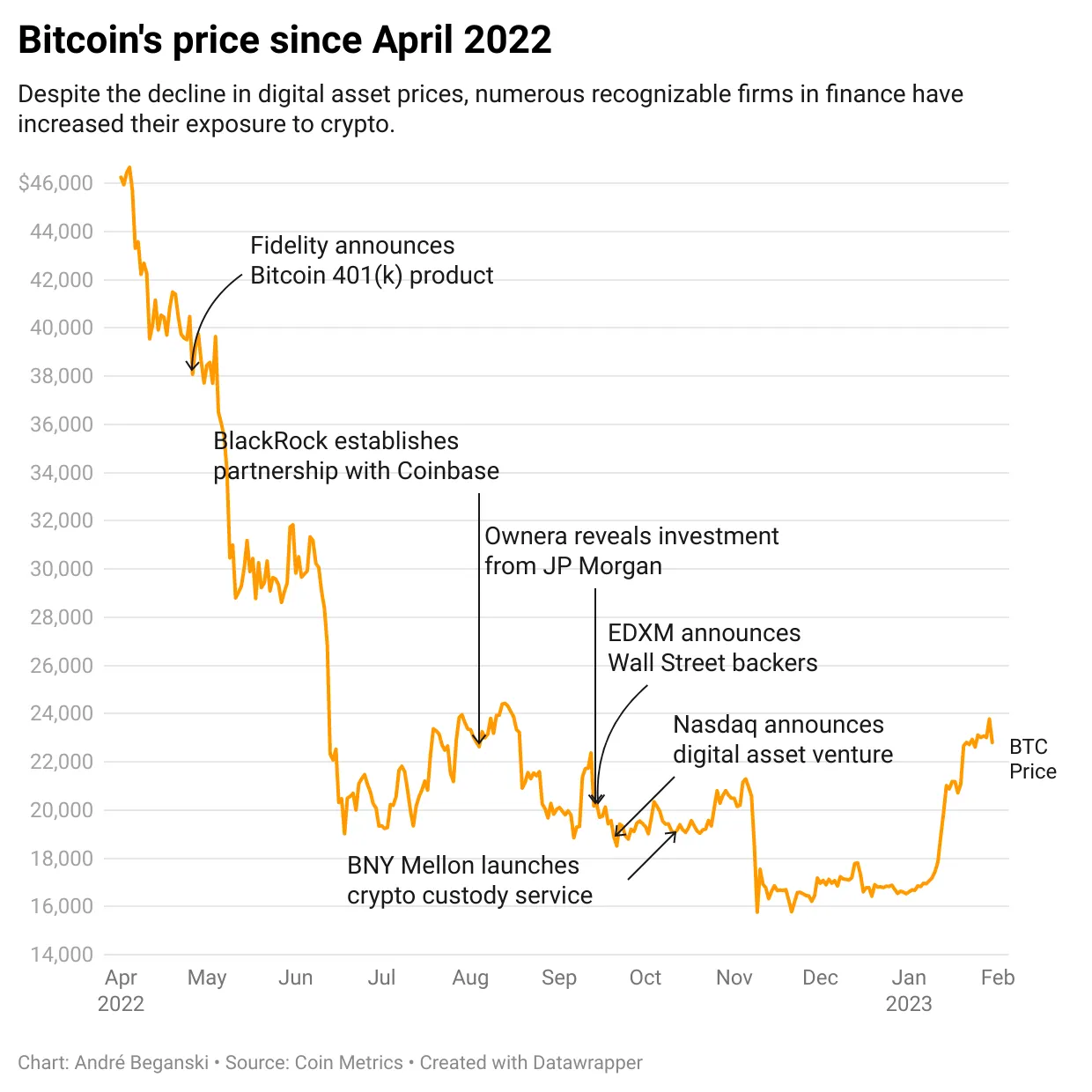As Bitcoin hovered around $38,000 last April—down 45% from its peak—Fidelity Investments announced its customers could soon add the digital asset to their retirement accounts through a first-of-its-kind offering.
By the time the firm’s 401(k) product launched the following fall, the value of Bitcoin had sunk even more, hammered throughout the summer by a tightening economy and fallout from the $60 billion implosion of cryptocurrencies Luna and TerraUSD. Bitcoin was changing hands at $20,000 by early November.
And then the crypto exchange FTX, once valued at $32 billion, buckled in Chapter 11 bankruptcy, casting a shadow over crypto as contagion from its collapse spread like wildfire. The exchange’s swift demise would shake confidence in digital assets even further, dragging down Bitcoin as far as $15,480, its lowest price in two years.
It was just about the worst timing for a trusted name with seven decades of investment management experience to offer crypto to retirement savers.
A group of U.S. senators, including Elizabeth Warren and Dick Durbin, urged Fidelity to reconsider its Bitcoin embrace, arguing that digital assets exposed retirement savers to unnecessary risk. “Any investment strategy based on catching lightning in a bottle, or motivated by the fear of missing out, is doomed to fail,” they stated in a letter. “We are already in a retirement security crisis, and it should not be made worse.”
But Fidelity’s Bitcoin offering still stands. It’s “offering a responsible option for plan sponsors who want to meet the interest in crypto,” a company spokesperson said.
And Fidelity is just one of many sizable firms that has not backed away—it continues to publicly declare that digital assets are rife with opportunity.
Considering Bitcoin was created as a way to cut out financial middlemen and let people own their own money, the steady adoption of crypto by traditional financial giants could be viewed as ironic. Their entrance has the potential to shift crypto away from its roots and dampen the industry’s defining traits, such as transaction transparency and self-custody of one’s assets.
Stepping off the sidelines
“There's a huge opportunity right now to get market share,” said Mike Boroughs, managing partner at blockchain investment firm Fortis Digital Ventures. “Big companies like BlackRock and Fidelity are getting in because they have the infrastructure to be able to build tools that people will immediately trust.”
BlackRock, the world’s largest asset manager with $8.6 trillion in assets under management, inked a partnership with Coinbase last August enabling clients of BlackRock’s investment management platform Aladdin to possess and trade digital assets, starting with Bitcoin.
That pact “really represents an inflection point for the industry," said Louis LaValle, managing director of Toronto-based investment fund 3iQ Digital Assets. "That is the first time that we saw a major, major financial institution in the U.S. trying to connect the pipes and plumbing to the crypto space."
Nasdaq’s crypto venture, Nasdaq Digital Assets, was unveiled in September. The exchange claims its new business will facilitate a broader degree of institutional participation in digital assets, starting off by giving firms a way to safely hold crypto.
BNY Mellon, America’s oldest bank, launched a service in October that also holds crypto for clients, beginning with Bitcoin and Ethereum–the first and second largest cryptocurrency by market value. As of September 30, BNY Mellon had $42.2 trillion in assets under custody and $1.8 trillion in assets under management.
Wall Street titans Fidelity, Charles Schwab, and Citadel Securities launched a cryptocurrency exchange together called EDXM. The venue “combines innovative technology with best practices from traditional finance,” such as a focus on regulatory compliance and mitigating conflicts of interest, according to EDXM’s website.
Investment bank JPMorgan backed the startup Ownera in a $20 million Series A funding round. Ownera is building a network for financial institutions that lets them exchange assets like stocks, bonds, and real estate in the form of digital tokens.
Many of these firms gathered at SALT in September, the finance conference from SkyBridge Capital CEO Anthony Scaramucci that has added more crypto-focused panels every year. At this year’s SALT event, Scaramucci announced that FTX had taken a 30% stake in SkyBridge—FTX would file for bankruptcy just two months later.
Dan Ariely, the Duke University psychology and behavioral economics professor known for his bestselling book “Predictably Irrational,” was among the SALT attendees. The growing institutional adoption of crypto, Ariely remarked to Decrypt, is “a natural response. I think, like everything, people and institutions follow the herd, and it looks like it's a thing that people don't want to miss.”

These institutions have signaled they’re primarily tapping digital assets as an alternative investment to stocks and bonds. A majority of hedge funds invested in cryptocurrencies last year sought to add more diversification to their portfolios through digital assets, according to a survey by PwC.
The trend represents a growing sense among institutions that digital assets are here to stay, said Richard Galvin, co-founder and chief executive of Digital Asset Capital Management.
"Having these discussions every day with institutional investors, there's a much higher level of conviction in the asset class than we've seen through previous cycles," he said. “A sell-off has actually been seen by a number of them for probably the first time as a significant opportunity.”
Serious investors believe crypto belongs in the portfolio
Some firms are becoming acquainted with blockchain technology, envisioning it as the basis for how mainstream markets function in the future. BlackRock CEO Larry Fink believes blockchain technology will be leveraged to create digital assets that represent securities like stocks and bonds, a process referred to as tokenization.
"The next generation for markets, the next generation for securities, will be tokenization of securities," he said at the New York Times DealBook Summit last November.
Even amid a market-wide meltdown last year, crypto continued to become more palatable for this set than it was before. A survey of more than 1,000 institutional investors by Fidelity found 51% had a positive perception of digital assets in 2022 compared to 45% in 2021.
The most common appeal of digital assets among institutional investors was their high potential upside, followed by the asset class’s tech innovation. More than 8 in 10 institutional investors surveyed said digital assets have a role in investment portfolios.
Stretching crypto’s original ideals of decentralization
There are obvious obstacles holding institutional investors back. In addition to the volatility of cryptocurrency prices, a common concern cited is the regulatory classification of crypto tokens—the current SEC has made abundantly clear it views most tokens as illegal securities—as well as cybersecurity concerns.
"Traditional institutions, some of them don't want to hold crypto at all because there is no refund at the end of the day if there's a security breach and your coins are stolen," said Brian Johnson, senior director at venture capital firm Republic Capital.
Following the implosion of FTX, retail investors rushed to self-custody their crypto, sending tokens to digital wallets they controlled as assets flowed off of exchanges at a near-record rate, according to Glassnode.
But the ability to have total control over one’s assets–an ideal core to crypto–is out of the question for a majority of financial firms. Many are registered with the SEC as investment advisors and required to keep assets with qualified custodians, which maintain client funds in a certain manner.
Financial firms are introducing trust into a system that’s intended to be trustless. They’re also obscuring the asset class’s aura of transparency and tilting the market away from retail traders as they stake a larger claim.
"Bigger investors are getting involved, and they're starting to drive the trading volume, starting to drive the price discovery process a lot more compared to retail," said Ben Tsai, president and managing partner at Wave Financial.

Firms have also injected more volatility into the crypto market, said Johnson from Republic Capital. While retail traders are more likely to buy and hold cryptocurrencies, financial institutions tend to trade tokens more frequently, he explained.
Institutional adoption has eroded the distinction of cryptocurrencies as an asset that behaves separate from other investments, particularly stocks. Last year, the price of Bitcoin became more correlated with the S&P 500 than at any other point in time going back to 2013, according to data from Coin Metrics.

“As more and more money within crypto is managed by institutions that are invested in other asset classes, I think they converge in terms of the correlations because of the emotions of the people managing the money–it’s the same people, the same emotions,” said Boroughs from Fortis Digital Ventures. “All financial markets are psychological markets of fear and greed.”
The crypto asset class is being driven by macroeconomic factors as a result of institutions’ participation, several analysts said. While supporters of digital assets have promoted cryptocurrencies as a hedge against inflation and the actions of central banks, prices react in real-time to monthly inflation reports and insight into interest rate hikes from the Federal Reserve.
Cryptocurrencies have been depicted by advocates as more transparent than traditional investments because their ownership is recorded on digital ledgers that are public and available for anyone to see. That also makes it easier to track the flow of funds between market participants, in theory.
However, many financial institutions aren't keen on telegraphing their moves. Some elect to trade cryptocurrencies over the counter with companies like Galaxy Digital or Genesis to cover their tracks, said Adam Struck, managing partner and founder of venture capital firm Struck Capital, adding it can also yield better prices than trading on an exchange.
"The issue is, all the order books on these [cryptocurrency] exchanges are public," he said. "If you're doing something OTC, your trade doesn't go on the order book, so in that sense it can be very advantageous for an institutional investor."
As the dust settles around the fall of FTX, numerous skeptics have weighed in to condemn crypto, from economist and columnist Paul Krugman to Berkshire Hathaway’s Charlie Munger.
But the actions of large financial institutions show that they believe crypto is here to stay—"otherwise," Boroughs said, "they wouldn't be building in it."

